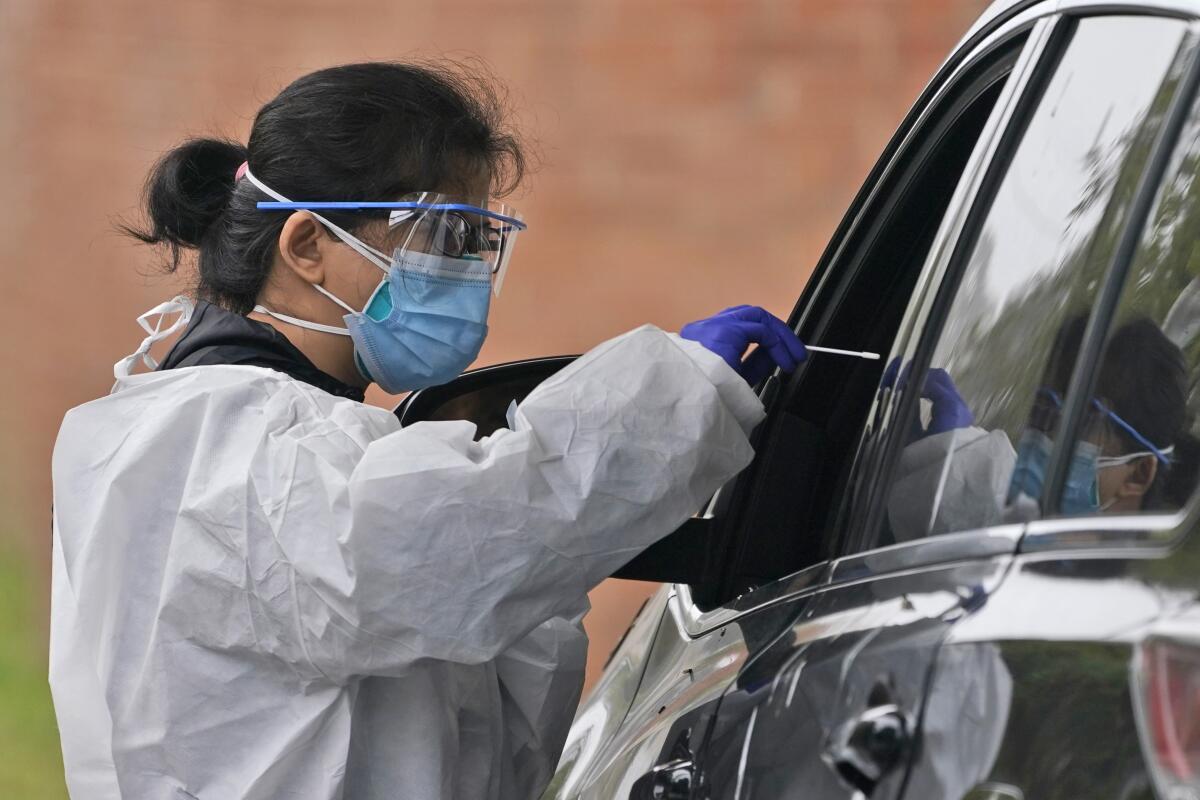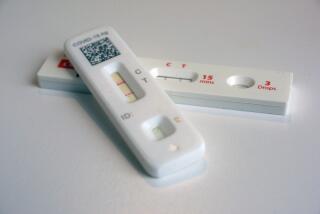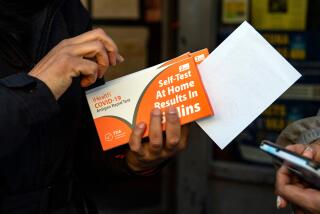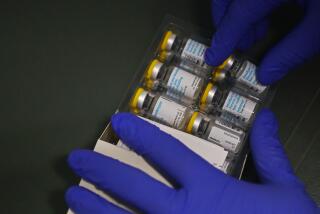Editorial: U.S. should go warp speed on testing too

- Share via
Americans are pinning their hopes on a vaccine for COVID-19 to bring this long pandemic nightmare to an end. And while it seems likely that there will be one or more federally approved vaccines by year’s end, even best-case scenarios estimate that it will be spring before there are enough doses for everyone in the country who wants one. That means another six months of pandemic restrictions and economic disruption.
There is another feasible option, and it’s a simple one: a massive screening program launched throughout the United States over the next two months, using new and promising low-cost rapid antigen tests that produce results in just minutes. By finding infections in asymptomatic people, such a screening program could prevent outbreaks and get the country back to some degree of normality long before there are enough vaccine doses to go around.
The U.S. failed at coronavirus testing at the outset of the pandemic. When federal officials should have been mobilizing the country’s vast resources to develop screening tools and protocols in January and February, they were instead telling Americans not to worry. The U.S. rejected tests developed by other countries but badly bungled the homegrown versions, sending out kits with faulty or missing chemicals. And though there are now some 21 million tests conducted in the U.S. each week, it’s not enough to get ahead of the infection.
But we still can do it. All we need is an Operation Warp Speed for testing.
Operation Warp Speed is what the Trump administration dubbed its initiative to marshal the resources of government, science, the military and the pharmaceutical industry to rapidly develop a coronavirus vaccine. So far, U.S. taxpayers have invested about $10 billion, and it seems to be paying off. Typically, it takes years if not decades to develop safe and effective vaccines. But in less than a year since the SARS-CoV-2 virus was first identified, there are several vaccine candidates in the final stages of clinical trials. At least two of them may be ready to seek federal approval for use by December. It’s been an incredible feat of science and government — and we can do the same again for testing.
We know too little about where the coronavirus is lurking, which is why so many businesses and activities remain restricted. But an initiative to quickly develop and produce millions of rapid coronavirus tests, along with specific protocols, could provide the data that communities need to safely reopen schools, churches, theme parks, bars and every other place that has been shuttered to prevent the virus from spreading. President Trump may not be a fan of increased testing because it would irrefutably show just how badly we’ve failed to control the spread of the novel coronavirus. But for the sake of the country, he should embrace it.
The technology to do rapid and regular screening exists and is being deployed. The federal government has purchased 150 million Abbott BinaxNOW diagnostic tests, which don’t require lab processing as the tests currently used do, and is distributing them to states. And the nonpartisan Rockefeller Foundation has already laid the groundwork for a testing initiative, developing an action plan and partnering with the U.S. Department of Health and Human Services to roll out pilot screening programs in a handful of cities, including Los Angeles.
That’s a start, but sustaining a screening program that can keep schools and businesses open until there are enough COVID-19 immunization programs will require more than 150 million tests each month. Other companies are developing rapid antigen tests, but to ensure there’s an adequate supply quickly, the federal government should pay for the tests in advance. If necessary, the administration should commit to using the Defense Production Act to compel manufacturers to produce the tests required to meet testing needs.
The Centers for Disease Control and Prevention has yet to develop protocols for when and how often the rapid tests should be used in schools, businesses and public facilities. It should do so soon.
An effective, safe and widely available vaccine is the best long-term answer for keeping the coronavirus under control. But it’s not going to help us in the short term with coronavirus cases surging in most U.S. states. Six more months of waves of infection, sickness and death will do long-term damage to the economy, to say nothing of the well-being of 330 million people. To avoid the “dark winter” that former Vice President Joe Biden warned about in Thursday’s presidential debate, the best option is an aggressive testing program to find and track infections so that flare-ups can be stopped before they begin.
More to Read
A cure for the common opinion
Get thought-provoking perspectives with our weekly newsletter.
You may occasionally receive promotional content from the Los Angeles Times.










